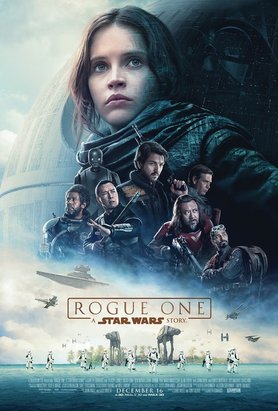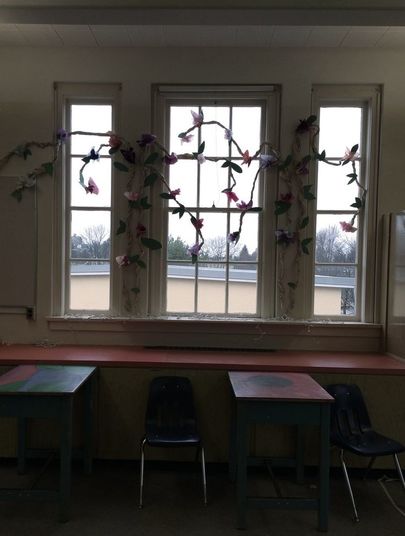 I have been shying away from writing a review of Rogue One, because it seems to me to be impossible to do so without spoiling it. So instead, I’m going to write a review of the reviews of Rogue One; specifically, I’m going to take issue with the use of the phrase “It’s for the fans.” Whether the writer of the review is a fan or a critic of fans, the use of this term strikes me as sloppy. If the writer is a fan, it is a dismissal of criticism; it gives the fan permission to ignore the potential flaws of the work in question. If the writer is a critic, the phrase “it’s for the fans” is a dismissal of value; it gives the critic permission to ignore the achievements of the work in question, on the basis that they are an outsider, who doesn’t get it. I can understand the use of this term in reference to The Force Awakens. Much as I enjoyed it, the main gambit of The Force Awakens was nostalgia; it relied heavily on the fact that its viewers had seen, and adored, the previous three movies in the series, and were anxious to see more of them. In fairness to The Force Awakens, it delivered; Star Wars fans can be notoriously difficult to please, and apparently what they (and we) wanted was in fact a movie almost exactly like the originals, but with a promise for more. This isn’t true of Rogue One. I can only speak from the perspective of a long-time fan, but it seems to me that it would be equally valid to see Rogue One before seeing A New Hope, as the other way around. A central reason for this is the fact that the characters of Rogue One are as unfamiliar to fans as they are to viewers new to the franchise; Jyn Erso and Cassian Andor are not household names, as Skywalker and Organa and Solo are. In the course of a couple of hours, the protagonists of Rogue One need to earn the sympathy of the viewer from scratch. Calling Rogue One “for the fans” ignores the fact that they do earn it. It ignores the shared despair and hope and triumph and tragedy. It ignores that this movie goes beyond simple themes of good, evil, and redemption, and taps into more complex themes of what we are willing to do for liberty, and what we give up in order to get it. It ignores the fact that the Star Wars universe is vast and varied, and can provide more than just fairy tales with princesses and knights; it can also provide stories with grit, dark humour, and political awareness. For the Star Wars universe to grow, the old guard of Solos and Skywalkers is not enough. It has had to create new characters, and it has had to make its viewers care, and care deeply, in a short space of time. Despite its nostalgia, The Force Awakens had to accomplish this as much as Rogue One did. Rey and Poe and Finn needed to be worth cheering for, just as Jyn and Cassian needed to be. It wasn’t enough for it to be “for the fans.” It also had to be good. If you have not already, go see Rogue One. Not because it’s for the fans, but because it’s how fans are born.
1 Comment
 Our stage, made ready for A Midsummer Night's Dream in 2014. Our stage, made ready for A Midsummer Night's Dream in 2014. When I’m not editing my novel, I edit Shakespeare. I am well past the point where I find this to be horrifying. Here is why. I have read, watched, acted in, studied, and taught a great deal of Shakespeare. I might once have thought that Shakespeare’s plays had to be studied in their entirety, but early on in my teaching career, I made the choice that I would rather have my students read a slightly abridged version of Shakespeare, than no Shakespeare at all. In my grade six and seven class, my students perform and study Shakespeare in Drama every year. It started out as one play a year; through popular demand, it became two. Bringing Shakespeare alive means performing it. One of my privileges as an elementary school teacher is that I teach all subject areas. This means that when my students learn Shakespeare, they don’t just read his work, or listen to me talk about his world; they push back the desks and jump on the countertops and wield swords made of cardboard. And it works. They get it. Shakespeare may seem inaccessible to a twelve-year-old at first glance, but it’s full of drama, anger, love, mistakes, and people stabbing each other. It’s basically Young Adult fiction written in iambic pentameter. Performing the plays has required me to make certain decisions and modifications to the works that I use. At the moment, the three plays that I have edited are A Midsummer Night’s Dream, Richard III, and Julius Caesar. I know – Julius Caesar and Richard III seem like slightly odd choices, but aside from Drama, they also fit well into the grade six and seven Social Studies curriculum of Ancient Rome and the Middle Ages. More importantly, they and A Midsummer Night’s Dream share something in common: they all have last casts, and enough roles for all my students. Once I’ve selected the plays, I look at the existing language. I don’t change it into modern English; that would defeat the point of reading it. I simply shorten it. This is generally true of performed plays as well; generally, some form of editing has taken place, and this is for the most part a good idea. Hamlet in its full form in about a four-hour performance; the only person intense enough to do that is Kenneth Branagh, who of course did. For most performers and viewers, an approach like that taken by the producers of The Hollow Crown is more appropriate; they focused on the scenes that convey the themes they wished to highlight, and removed the rest. My final piece of editing involves me adding something instead of removing it. In tackling history plays like Julius Caesar, it became obvious that some background information was needed, and so I created Raj and Ky. Raj and Ky are time-travelling students, who travel in time to observe and comment on the events of the plays (for an excerpt of them as a Prologue to Richard III, see the block quote insert). It may seem a bit cheesy, but again, it works. With a little bit of information to start with, my students memorize and perform the plays, sympathize with the characters, and come to understand Shakespeare’s work from the inside out. Best of all, this access to Shakespeare stays not only with them, but with their friends and with the classes in the school who see the performances. Shakespeare is no longer something on a page; it’s something alive, powerful and relevant, an experience to be desired, and in some cases, demanded. On the first day back to school this year, one of my grade seven students, who had been in my class the previous year, walked into my room and said, “When do we start Shakespeare?” Right away. Ky: Let me check the date…. Oh. |
Author
Jane Perrella. Teacher, writer. Expert knitter. Enthusiast of medieval swordplay, tea, Shakespeare, and Batman. Archives
June 2019
Categories |
 RSS Feed
RSS Feed
